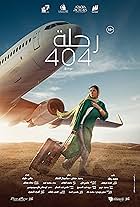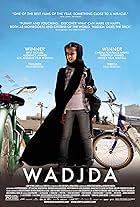Matar has to give everything to fight for Hofira's life in this ageless coming of age drama.Matar has to give everything to fight for Hofira's life in this ageless coming of age drama.Matar has to give everything to fight for Hofira's life in this ageless coming of age drama.
- Awards
- 1 win & 3 nominations total
Mohamed Helal
- Saleh
- (as Mohamed hilal)
Omar Ateeq
- The Security Official
- (as Omar Zawaydah)
Storyline
Did you know
- TriviaAll the jockeys in the film, were actual Bedouins from the Wadi Rum desert who were put through professional training along with their camels.
Featured review
In Saudi Arabia, there is a culture of camel racing, and "hajjan" is a camel-racing jockey. Matar is a teen boy from a line of camel racers. When his older brother gets knocked off his camel in a race and dies, Matar is supposed to join his nearest relative, his uncle, in the city, and his beloved camel Hofira sold for meat. Matar successfully pleads to be able to race his camel at least once, but his success meant that Hofira is instead sold to the local camel-racing baron, and Matar is allowed to go along.
There, he finds an owner who is obsessed with the immortality of winning the Great Race. His local tactics include having "support" camels, whose riders interfere with potential challengers in the race, a tactic he could not apply to the Great Race, until Matar qualifies Hofira as a second camel.
An interesting slice of the camel racing culture was the support cars. Not only does the play-by-play announcer drive around the outside of the track in a car following the action, various coaches / trainers are racing along, calling in instructions by pocket radio. Another is how male-dominated the culture is. The only women in the film were the owner's wife and step-daughter.
I saw this at the world premiere at the Toronto International Film Festival, where the director considered this to be a "western" - someone coming into town and cleaning it up, though in this case the cleaner was a young man, who was cast partly because he "looked innocent". Matar is buffeted by various interpretations of what it means to be a "real man", and it is the path he takes that leads to the "cleanup" ending, not some form of gunslinging. The film also reflected the myths and legends passed on, where oral history has everyone having a grandfather who was a great hajjan. Interestingly, despite the years posted on the wall of victors, the director kept time-marking artifacts (like cell phones) to a minimum, trying to create a somewhat timeless story.
There, he finds an owner who is obsessed with the immortality of winning the Great Race. His local tactics include having "support" camels, whose riders interfere with potential challengers in the race, a tactic he could not apply to the Great Race, until Matar qualifies Hofira as a second camel.
An interesting slice of the camel racing culture was the support cars. Not only does the play-by-play announcer drive around the outside of the track in a car following the action, various coaches / trainers are racing along, calling in instructions by pocket radio. Another is how male-dominated the culture is. The only women in the film were the owner's wife and step-daughter.
I saw this at the world premiere at the Toronto International Film Festival, where the director considered this to be a "western" - someone coming into town and cleaning it up, though in this case the cleaner was a young man, who was cast partly because he "looked innocent". Matar is buffeted by various interpretations of what it means to be a "real man", and it is the path he takes that leads to the "cleanup" ending, not some form of gunslinging. The film also reflected the myths and legends passed on, where oral history has everyone having a grandfather who was a great hajjan. Interestingly, despite the years posted on the wall of victors, the director kept time-marking artifacts (like cell phones) to a minimum, trying to create a somewhat timeless story.
- How long is Hajjan?Powered by Alexa
Details
- Release date
- Countries of origin
- Language
- Also known as
- Sea of Sands
- Filming locations
- Tabuk, Saudi Arabia(Neom, Saudi Arabia)
- Production companies
- See more company credits at IMDbPro
- Runtime1 hour 57 minutes
- Color
Contribute to this page
Suggest an edit or add missing content






















